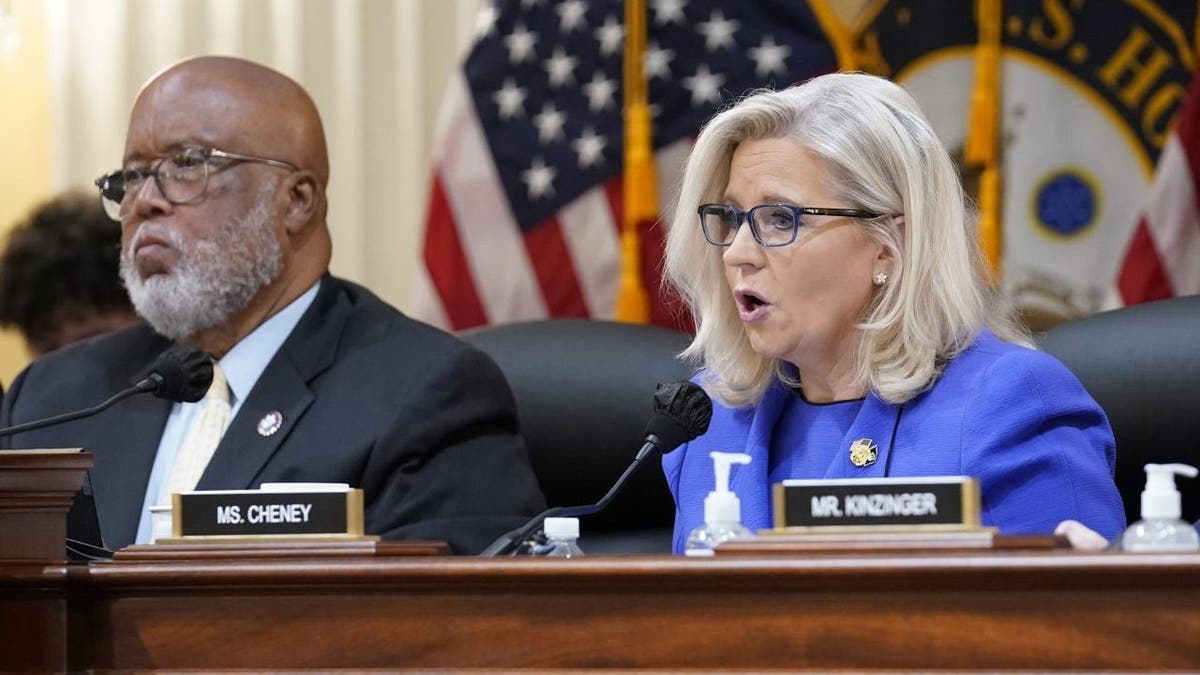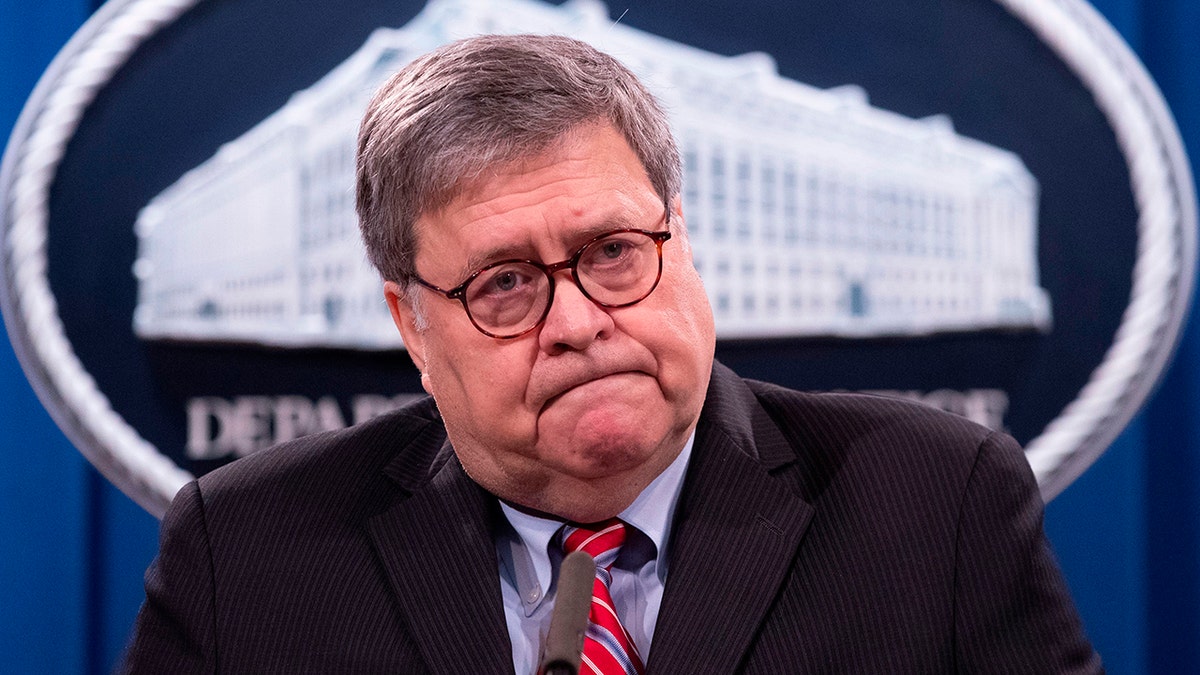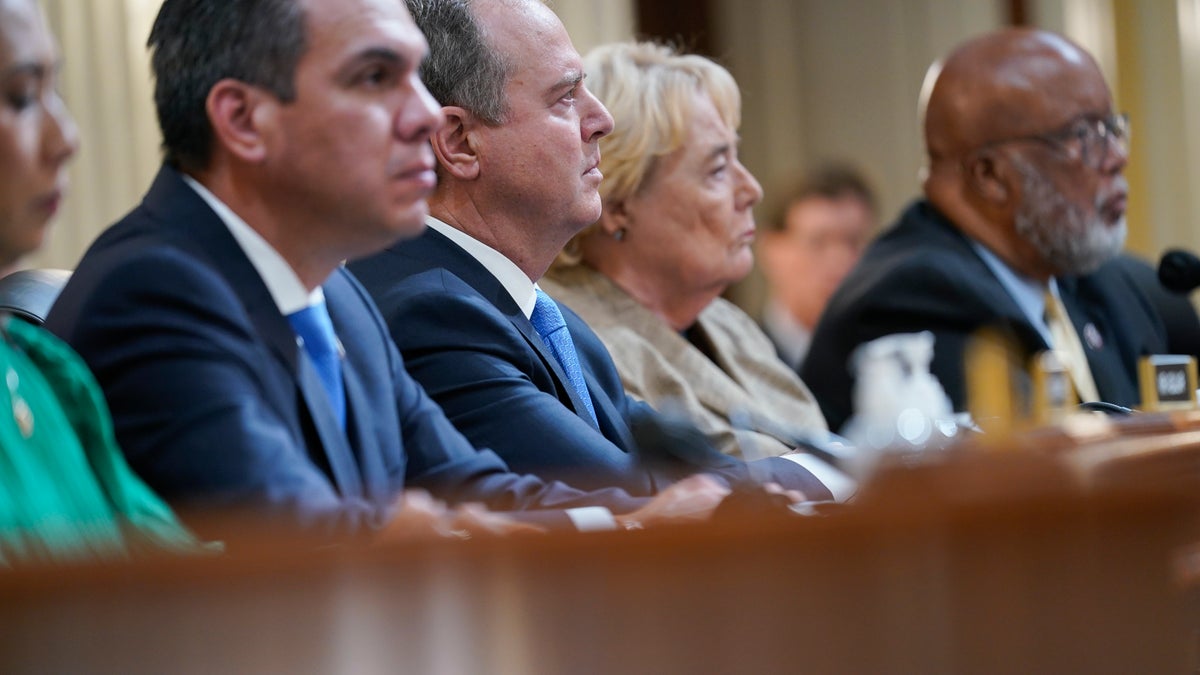Turley: Barr is vindicated in Jan. 6 hearings
Fox News contributor Jonathan Turley says former Attorney General Bill Barr is being seen as the 'champion of democracy' after some Democrats on the House Select Committee previously labeled him as dangerous.
The House Select Committee on Jan. 6 held its second public hearing Monday, which featured testimony from then-President Trump’s campaign aides and lawyers who said the president ignored their advice on Election Day and proceeded to push election fraud conspiracies that had no factual basis.
Committee Vice Chair Liz Cheney, R-Wyo., declared during her opening statement that Trump ignored the advice of his campaign team on election night to instead rely on an "apparently inebriated" Rudy Giuliani, his former personal lawyer.

Vice Chair Liz Cheney, R-Wyo., gives her opening remarks as Committee Chairman Rep. Bennie Thompson, D-Miss., left, looks on, as the House select committee investigating the Jan. 6 attack on the U.S. Capitol holds its first public hearing to reveal the findings of a year-long investigation, at the Capitol in Washington, Thursday, June 9, 2022.
"Trump rejected the advice of his campaign experts on election night, and instead followed the course recommended by an apparently inebriated Rudy Giuliani, to just claim that he won," Cheney said.
"The Trump campaign legal team knew there was no legitimate argument – fraud irregularities or anything to overturn the election, and yet President Trump went ahead with his plans for Jan. 6 anyway," she said.
Biden's Attorney General Merrick Garland said Monday after the hearing that both he and the Jan. 6 Department of Justice prosecutors will be watching the hearings and "at this point, this investigation is proceeding according to facts and the law. We are not obstructed from continuing our investigation in any way."
JAN. 6 COMMITTEE HOLDS FIRST PUBLIC HEARING INVESTIGATING ATTACK ON THE US CAPITOL
Former Trump campaign spokesperson Jason Miller said Giuliani "was definitely intoxicated" when he advised the then-president to declare victory on election night, against the advice of his campaign team and while ballots were still being counted in multiple states.
"The mayor was definitely intoxicated, but I do not know his level of intoxication when he spoke with the president, for example," Miller said in videotaped testimony aired at the hearing. "I think, effectively, Mayor Giuliani was saying, 'We won it. They're stealing it from us. Where did all the votes come from? We need to go say that we won,' and essentially that anyone who didn't agree with that position was being weak."
Former Trump campaign manager Bill Stepien, who abruptly canceled his appearance at the hearing after his wife went into labor, said in his pre-recorded testimony that he told Trump on election night that it was too early to declare victory but that the then-president disagreed.
Stepien said that shortly after the election, the campaign quickly divided into "Team Normal," his team, versus "Rudy’s Team," and that Trump routinely sided with Rudy's team.
"I didn't think what was happening was necessarily honest or professional at that point in time, so that led to me stepping away," he said.
Matthew Morgan, chief lawyer of Trump’s campaign, and Alex Cannon, a former Trump campaign lawyer, also said that in the weeks following the election they couldn’t find any substantiating evidence of voter fraud despite Trump’s many various allegations to the contrary.
JAN. 6 HEARINGS: WATCH MONDAY'S CONGRESSIONAL HEARING LIVE
"I had conversations with probably all of our counsel who are signed up to assist on Election Day as they disengaged with the campaign," Morgan said. "The general consensus was that the law firms were not comfortable making the arguments that Rudy Giuliani was making publicly."
Former Attorney General Bill Barr testified that he knew immediately following the election that former Trump’s claims of voter fraud were "bulls---" and that Trump’s continued promotion of the conspiracy theory ultimately led to his resignation.
"Right out of the box, on election night the president claimed that there was major fraud underway," Barr said. "I mean, this happened, as far as I could tell, before there was actually any potential evidence, and it seemed to be based on the dynamic that at the end of the evening a lot of Democratic votes came in, which changed the vote counts in certain states… I didn't think much of that, because people had been talking for weeks and everyone understood for weeks that that was going to be what happened on election night."

Attorney General William Barr looks on during a news conference at the Department of Justice in Washington, Dec. 21, 2020. (MICHAEL REYNOLDS/POOL/AFP via Getty Images)
Barr said he made it clear with Trump that he did not agree with his election fraud claims.
"I made it clear I did not agree with the idea of saying the election was stolen and putting out this stuff, which I told the president was bulls---," Barr said. "And, you know, I didn't want to be a part of it. And that's one of the reasons that went into me deciding to leave when I did."
Barr recalled a meeting with Trump on Dec. 14, the same day Barr resigned, in which Barr said he reiterated there was no evidence of election fraud, including among Dominion voting machines.
"I reiterated that they wasted a whole month on these claims, on the Dominion voting machines, and they were idiotic claims," he said. "And I told them that it was crazy stuff, and they were wasting their time on that and was doing great, grave disservice to the country."
"I was somewhat demoralized because I thought, ‘Boy, if he really believes this stuff, he has lost contact with, he's become detached from reality if he really believes this stuff,’" he continued. "And on the other hand, you know, when I went into this and would you know, tell him how crazy some of these allegations were, there was never an indication of interest in what the actual facts were."
"I felt that before the election it was possible to talk sense to the president," Barr added. "And while you sometimes had to engage in, you know, big wrestling match with him and that it was possible to keep things on track. But I always felt that after the election he didn't seem to be listening, and I didn't think it was, you know, that I was inclined not to stay around if he wasn't listening to advice from me or his other cabinet secretaries."
Committee member Rep. Zoe Lofgren, D-Calif., said the rejection of Trump's litigation efforts by federal judges was "overwhelming."
"Twenty-two federal judges appointed by Republican presidents, including 10 appointed by President Trump himself, and at least 24 elected or appointed Republican state judges dismissed the president's claims," she said.

From left to right, Rep. Stephanie Murphy, D-Fla., Rep. Pete Aguilar, D-Calif., Rep. Adam Schiff, D-Calif., Rep. Zoe Lofgren, D-Calif., and Chairman Bennie Thompson, D-Miss., listen as the House select committee investigating the Jan. 6 attack on the U.S. Capitol holds its first public hearing to reveal the findings of a year-long investigation, on Capitol Hill, Thursday, June 9, 2022, in Washington. (AP Photo/Andrew Harnik)
"At least 11 lawyers have been referred for disciplinary proceedings due to bad faith and baseless efforts to undermine the outcome of the 2020 presidential election," she continued.
"President Trump continued to push the stolen election narrative, even though he and his allies knew that their litigation efforts making the same claim had failed," she added. "It’s worth pointing out that litigation generally does not continue past the ‘safe harbor’ date of Dec. 14. But the fact that this litigation went on, well, that decision makes more sense when you consider the Trump campaign’s fundraising tactics, because if the litigation had stopped on Dec. 14, there would have been no fight to defend the election and no clear path to continue to raise millions of dollars."
CLICK HERE TO GET THE FOX NEWS APP
The committee's next public hearing is scheduled to begin Wednesday morning at 10 a.m. ET.
Cheney said Monday that the next hearing will focus on Trump’s role in the Jan. 6 mob attack at the U.S. Capitol and his "detailed planning with lawyer John Eastman to pressure the vice president, state legislatures, state officials and others to overturn the election."






















